Pressure Washing Lake Fenton
Best Exterior Cleaning in Lake Fenton
Receive up to 3 Exterior Cleaning quotes for your project today! Compare profiles, reviews, accreditations, portfolio, etc... and choose the best offer.
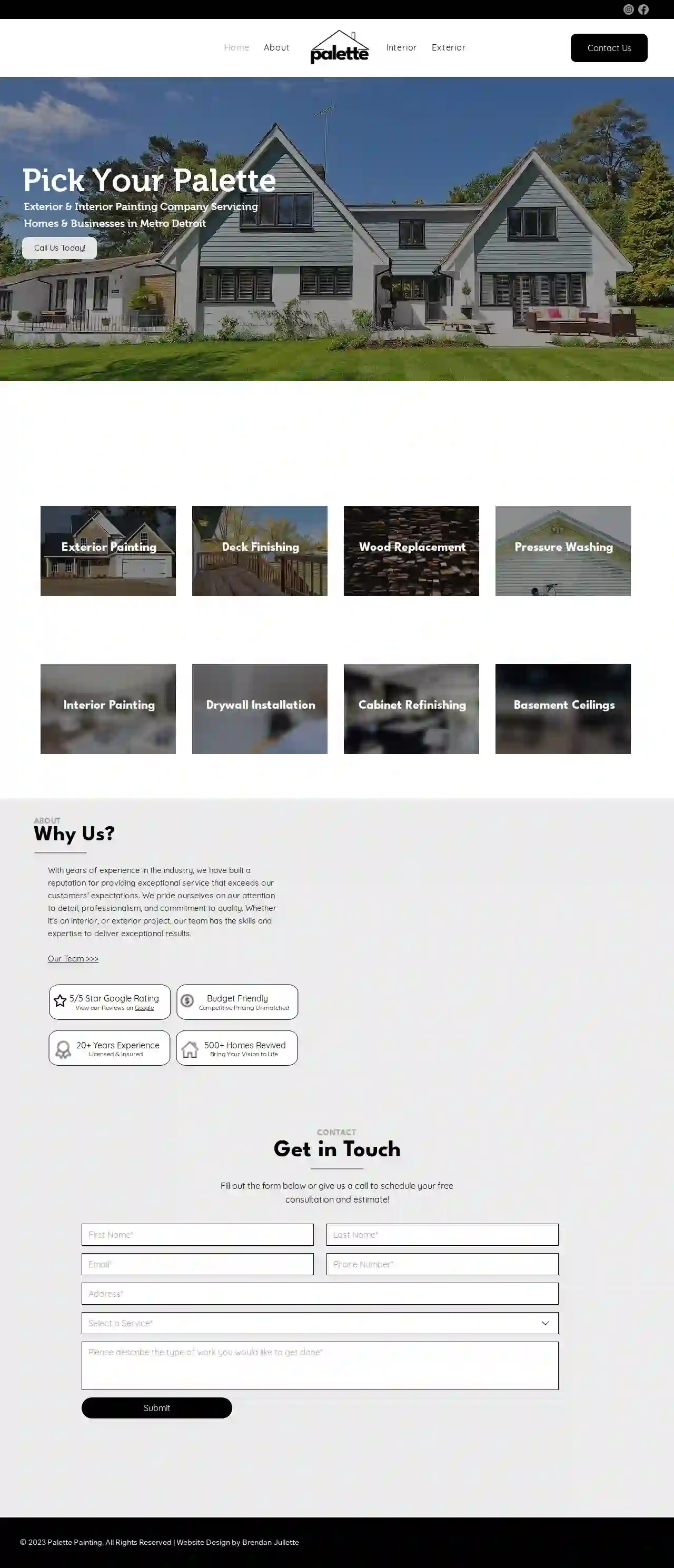
Palette Painting
513 reviewsSuite 456, 123 Main St, Farmington Hills, 48075, USPalette Painting LLC is a reputable exterior and interior painting company that has been serving homes and businesses in Metro Detroit for over 20 years. They offer a range of services including exterior painting, deck finishing, wood replacement, pressure washing, interior painting, cabinet refinishing, basement ceilings, and drywall installation. Their team is skilled, professional, and committed to delivering exceptional results. They have a 5/5 star Google rating and pride themselves on their attention to detail and competitive pricing.
- Services
- Why Us?
- Accreditations
- Our Team
- Testimonials
- Gallery
Get Quote
ProTech Pressure Wash LLC
4.9130 reviews123 Main St, Suite 101, Clinton Township, 48035, USProTech Pressure Wash LLC is a professional pressure washing and soft washing company serving the areas surrounding Clinton Township Michigan, the Grosse Pointe Communities, all of Macomb county and more!
- Services
- Why Us?
- Accreditations
- Our Team
- Testimonials
- Gallery
Get Quote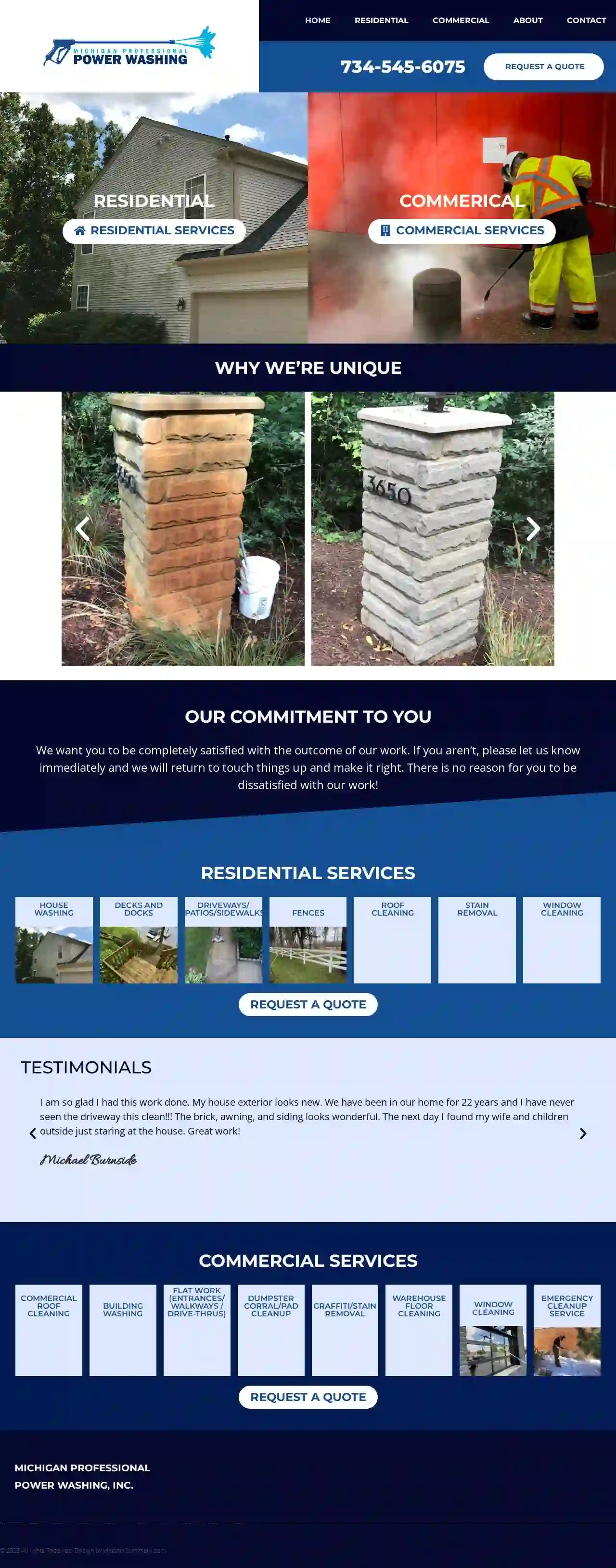
Michigan Professional Power Washing, Inc.
514 reviewsAnn Arbor, USMichigan Professional Power Washing, Inc. is your trusted source for professional power washing services in Michigan. We offer a wide range of services for both residential and commercial clients, including house washing, deck and dock cleaning, driveway and patio cleaning, fence cleaning, roof cleaning, stain removal, and window cleaning. We are committed to providing our clients with the highest quality service at competitive prices. Our team of experienced and certified professionals uses the latest equipment and techniques to ensure that your property is cleaned safely and effectively. We understand that your property is an important investment, and we take pride in helping our clients maintain its value. Whether you need a one-time cleaning or regular maintenance, we are here to help. Contact us today for a free estimate!
- Services
- Why Us?
- Our Team
- Testimonials
- Gallery
Get Quote
Xtreme Wash
5120 reviews24945 Marine Ave, Eastpointe, 48021, USOver time, dirt, grime, mold, algae, and debris can accumulate on your property’s exterior surfaces, making it look old and neglected. Unfortunately, it can be challenging to remove these contaminants with regular cleaning. Pressure washing is the most effective way to remove years of accumulated dirt, grime, and other contaminants, restoring your building’s original appearance and improving its value. Studies show that professional pressure washing can boost your home’s value by 5-10%. At Xtreme Wash, we pride ourselves on providing quality residential and commercial pressure washing services at competitive prices. Our experienced team understands all aspects of power washing and soft washing and strives to deliver 100% customer satisfaction.
- Services
- Why Us?
- Gallery
Get Quote
Moeh Services
534 reviewsAnn Arbor, USMOEH SERVICES is a professional cleaning company that offers a range of services to both commercial and residential customers in the Metro-Detroit area. Our mission is to guarantee customer satisfaction and earn more great reviews. We are insured and certified, and our team of friendly professionals is dedicated to providing top-notch cleaning services. With a focus on customer satisfaction, we ensure that every job meets our high standards. We offer a variety of services, including power washing, window washing, deck staining, paver sand and seal, gutter cleaning, interior window washing, Christmas lights, concrete clean and seal, rust and efflourence removal, graffiti removal, and roof washing. We also offer commercial services to help businesses maintain a clean and welcoming environment. Our team is committed to providing exceptional service and ensuring that our customers are completely satisfied with our work.
- Services
- Why Us?
- Gallery
Get Quote
Xtreme Power Washing, LLC
521 reviewsKalamazoo, USRELYING ON US TO GET THE JOB DONE RIGHT THE FIRST TIME. We work hard to make sure that your prospective customers see your best image. Because when you look good, we look good! We’re Leading in Fleet Washing Business We work when it’s Convenient for you. Most commercial vehicles are on the road during the day and don’t get back most nights till late or not even till the weekend. We schedule after hours and travel to YOU, while suppling EVERYTHING. Let us help maintain your fleet and give you the relief knowing it will be done right.
- Services
- Why Us?
- Testimonials
- Gallery
Get Quote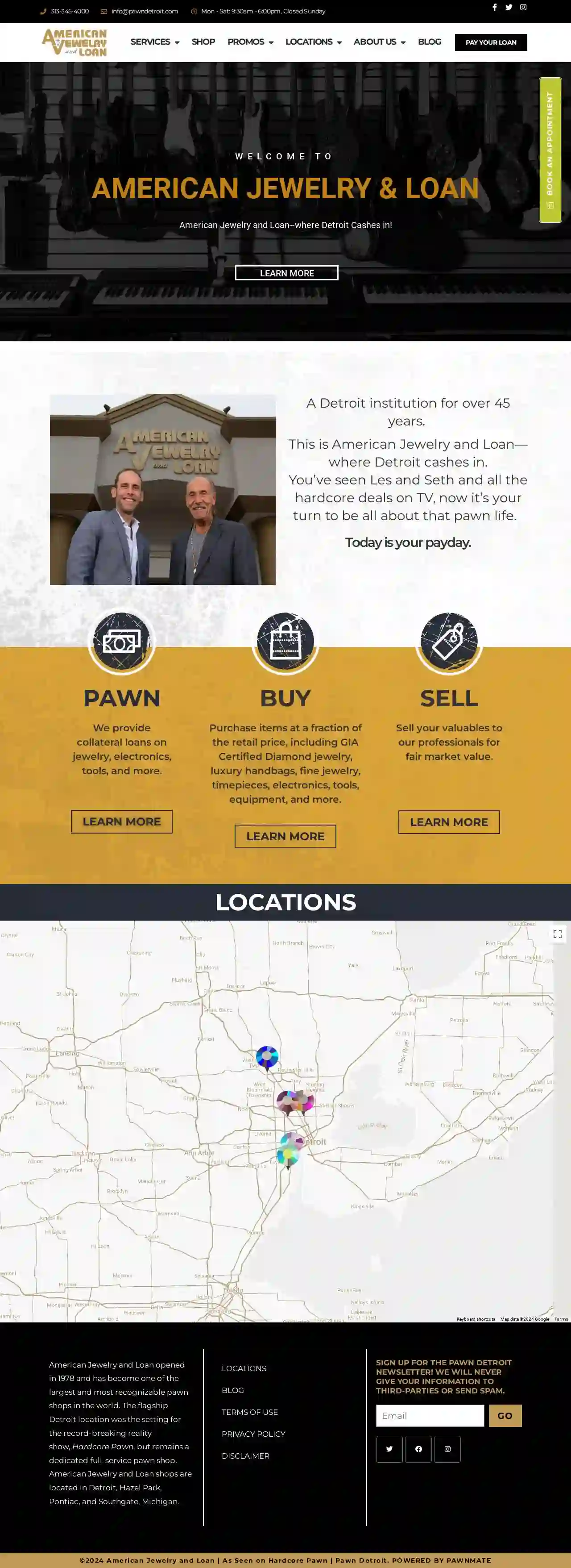
American Jewelry & Loan
4.6204 W. Baltimore St., Detroit, 48201, USAmerican Jewelry and Loan is a Detroit institution for over 45 years. This is where Detroit cashes in. You've seen Les and Seth and all the hardcore deals on TV, now it's your turn to be all about that pawn life. Today is your payday.
- Services
- Why Us?
- Accreditations
- Our Team
- Testimonials
- Gallery
Get Quote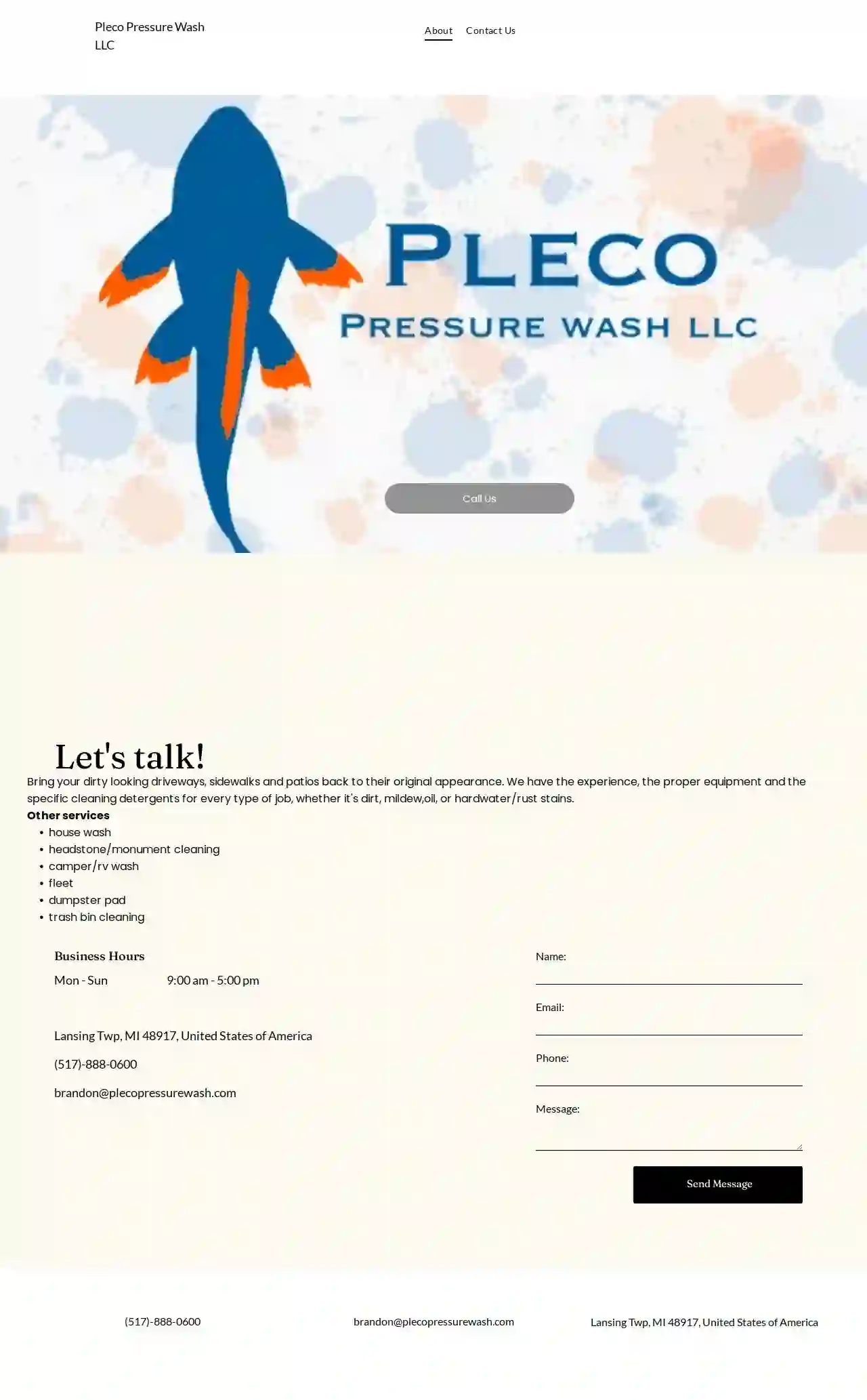
Pleco Pressure Wash LLC
Lansing Twp, MI, Lansing, 48917, USPleco Pressure Wash LLC is your local solution for bringing back the beauty of your outdoor spaces. We specialize in cleaning driveways, sidewalks, patios, and more, removing dirt, mildew, oil, hard water stains, and rust. With our experience, specialized equipment, and effective cleaning detergents, we tackle every job with precision and care. Beyond standard pressure washing, we offer a range of services to meet your unique needs: House Washing Headstone/Monument Cleaning Camper/RV Wash Fleet Washing Dumpster Pad Cleaning Trash Bin Cleaning Contact us today for a free estimate and let us restore your property to its former glory!
- Services
- Why Us?
- Our Team
- Gallery
Get Quote
Ever Clean Pressure Washing LLC
4.127 reviewsGarden City, MI, 48135, USEver Clean Pressure Washing is a locally owned and operated pressure washing contractor operating out of Garden City, MI. We offer a variety of residential and commercial cleaning services including low pressure house washing, roof cleaning, deck restoration, and much, much more. We are dedicated to delivering professional cleaning and friendly customer care for an exceptional customer experience. Contact Ever Clean Pressure Washing if you have any questions about our cleaning services, need more information, or want to schedule your next cleaning project. Contact us today for a free estimate. We look forward to working with you!
- Services
- Why Us?
- Testimonials
- Gallery
Get Quote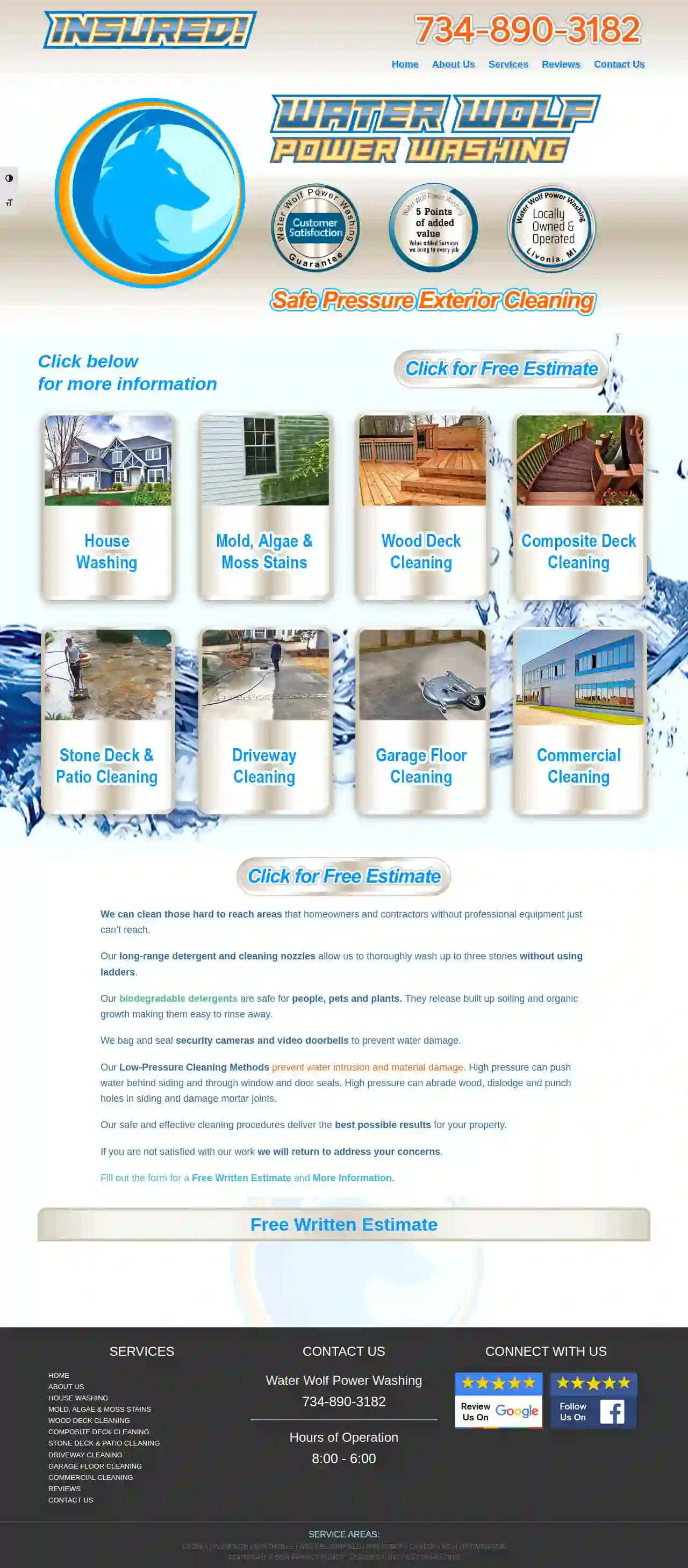
Water Wolf Power Washing
57 reviewsAnn Arbor, USAt Water Wolf Power Washing, we perform exceptional work at a competitive price. We are a full service power washing company using professional equipment, accessories and tested cleaning techniques. We use environmentally friendly detergents and stain removers specifically suited to the surfaces we are cleaning. These products are safe for people, animals and plants. We don't use the same pressure to clean vinyl siding that we use to clean wood and we don't use the same pressure to clean wood that we use to clean concrete. Knowing what pressure to wash at is essential for producing a thorough cleaning that that does no damage to the surface we are washing. We're not a big company. Right now it's just one person and that means all the work is being done by someone with 10+ years' experience in exterior cleaning. You won't have a trainee with minimal experience using high pressure equipment on your valuable property.
- Services
- Why Us?
- Our Team
- Testimonials
- Gallery
Get Quote
Over 60,241+ Janitorial Companies on our directory
Our cleaning pros operate in Lake Fenton & beyond!
CleaningMatch has curated and vetted Top Cleaning Companies in Lake Fenton. Find a top & reliable contractor today.
Frequently Asked Questions About Pressure Washing
- Electric Pressure Washers: Suitable for light-duty cleaning tasks like washing cars, patios, or fences. They are less powerful than gas pressure washers but are generally more affordable and easier to operate.
- Gas Pressure Washers: More powerful than electric pressure washers, making them suitable for heavier cleaning tasks like removing stubborn stains, cleaning driveways, or stripping paint.
- PSI and GPM: Consider the PSI (Pounds per Square Inch) and GPM (Gallons per Minute) ratings. Higher PSI and GPM indicate a more powerful pressure washer. For most home cleaning tasks, a pressure washer with a PSI of 2000-3000 and a GPM of 2-3 is sufficient.
- Online Reviews: Check online reviews on platforms like Google, Yelp, and Facebook to gauge customer satisfaction and service quality.
- Experience and Expertise: Look for companies with a proven track record and experience in pressure washing various surfaces.
- Licensing and Insurance: Ensure the company is licensed and insured to protect you from liability in case of accidents or damage.
- Equipment and Techniques: Inquire about the company's equipment and techniques to ensure they use appropriate pressure levels and cleaning solutions for different surfaces.
- Quotes and Pricing: Obtain detailed quotes from multiple pressure washing companies and compare their pricing. Make sure the quotes are transparent, outlining all services and costs.
- Professionalism and Communication: Choose a company that is responsive, provides clear communication, and demonstrates professionalism in its interactions.
- Spring and Fall: Spring and fall are often ideal for pressure washing as the temperatures are moderate and the weather is typically dry.
- Summer: Pressure washing can be done in the summer, but avoid doing so during the hottest part of the day to prevent the cleaning solutions from drying too quickly and leaving streaks.
- Winter: Pressure washing is possible in the winter, but be mindful of freezing temperatures that can affect cleaning solutions and cause slippery surfaces.
- Experience: 'How long have you been in business, and what types of pressure washing projects do you specialize in?'
- Licensing and Insurance: 'Are you licensed, insured, and bonded? Can I see proof of coverage?'
- Equipment and Techniques: 'What type of pressure washer do you use? What cleaning solutions do you use, and are they safe for my surfaces?'
- Safety Precautions: 'What safety precautions do you take during pressure washing?'
- Surface Preparation: 'Will you need to move any furniture or objects before pressure washing?'
- Water Usage: 'Do you use a water reclamation system or other methods to conserve water?'
- Cleanup: 'How do you handle cleanup after pressure washing?'
- Guarantees: 'Do you offer a satisfaction guarantee?'
- References: 'Can you provide references from previous clients?'
What type of pressure washer do I need for my home?
If you're unsure about the type of pressure washer best suited for your needs, consult with a pressure washing professional or a home improvement specialist.
How do I find a good pressure washing service?
Utilize online directories like CleaningMatch to find and compare qualified pressure washing services in your area.
What is the best time of year for pressure washing?
Choose a day with mild temperatures and dry weather for optimal pressure washing results. Avoid pressure washing in extreme heat, freezing temperatures, or rainy conditions.
What questions should I ask a pressure washing contractor before hiring them?
By asking these questions, you can gather valuable information and choose a pressure washing contractor that meets your requirements.
What type of pressure washer do I need for my home?
- Electric Pressure Washers: Suitable for light-duty cleaning tasks like washing cars, patios, or fences. They are less powerful than gas pressure washers but are generally more affordable and easier to operate.
- Gas Pressure Washers: More powerful than electric pressure washers, making them suitable for heavier cleaning tasks like removing stubborn stains, cleaning driveways, or stripping paint.
- PSI and GPM: Consider the PSI (Pounds per Square Inch) and GPM (Gallons per Minute) ratings. Higher PSI and GPM indicate a more powerful pressure washer. For most home cleaning tasks, a pressure washer with a PSI of 2000-3000 and a GPM of 2-3 is sufficient.
If you're unsure about the type of pressure washer best suited for your needs, consult with a pressure washing professional or a home improvement specialist.
How do I find a good pressure washing service?
- Online Reviews: Check online reviews on platforms like Google, Yelp, and Facebook to gauge customer satisfaction and service quality.
- Experience and Expertise: Look for companies with a proven track record and experience in pressure washing various surfaces.
- Licensing and Insurance: Ensure the company is licensed and insured to protect you from liability in case of accidents or damage.
- Equipment and Techniques: Inquire about the company's equipment and techniques to ensure they use appropriate pressure levels and cleaning solutions for different surfaces.
- Quotes and Pricing: Obtain detailed quotes from multiple pressure washing companies and compare their pricing. Make sure the quotes are transparent, outlining all services and costs.
- Professionalism and Communication: Choose a company that is responsive, provides clear communication, and demonstrates professionalism in its interactions.
Utilize online directories like CleaningMatch to find and compare qualified pressure washing services in your area.
What is the best time of year for pressure washing?
- Spring and Fall: Spring and fall are often ideal for pressure washing as the temperatures are moderate and the weather is typically dry.
- Summer: Pressure washing can be done in the summer, but avoid doing so during the hottest part of the day to prevent the cleaning solutions from drying too quickly and leaving streaks.
- Winter: Pressure washing is possible in the winter, but be mindful of freezing temperatures that can affect cleaning solutions and cause slippery surfaces.
Choose a day with mild temperatures and dry weather for optimal pressure washing results. Avoid pressure washing in extreme heat, freezing temperatures, or rainy conditions.
What questions should I ask a pressure washing contractor before hiring them?
- Experience: 'How long have you been in business, and what types of pressure washing projects do you specialize in?'
- Licensing and Insurance: 'Are you licensed, insured, and bonded? Can I see proof of coverage?'
- Equipment and Techniques: 'What type of pressure washer do you use? What cleaning solutions do you use, and are they safe for my surfaces?'
- Safety Precautions: 'What safety precautions do you take during pressure washing?'
- Surface Preparation: 'Will you need to move any furniture or objects before pressure washing?'
- Water Usage: 'Do you use a water reclamation system or other methods to conserve water?'
- Cleanup: 'How do you handle cleanup after pressure washing?'
- Guarantees: 'Do you offer a satisfaction guarantee?'
- References: 'Can you provide references from previous clients?'
By asking these questions, you can gather valuable information and choose a pressure washing contractor that meets your requirements.